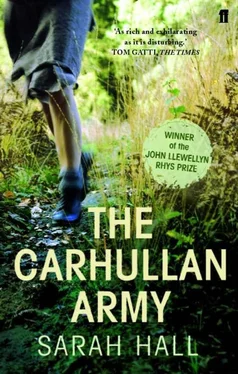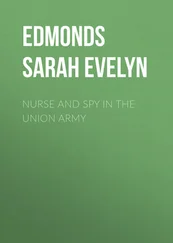Sarah Hall - The Carhullan Army
Здесь есть возможность читать онлайн «Sarah Hall - The Carhullan Army» весь текст электронной книги совершенно бесплатно (целиком полную версию без сокращений). В некоторых случаях можно слушать аудио, скачать через торрент в формате fb2 и присутствует краткое содержание. Год выпуска: 2008, Издательство: Faber and Faber, Жанр: Современная проза, на английском языке. Описание произведения, (предисловие) а так же отзывы посетителей доступны на портале библиотеки ЛибКат.
- Название:The Carhullan Army
- Автор:
- Издательство:Faber and Faber
- Жанр:
- Год:2008
- ISBN:нет данных
- Рейтинг книги:4 / 5. Голосов: 1
-
Избранное:Добавить в избранное
- Отзывы:
-
Ваша оценка:
- 80
- 1
- 2
- 3
- 4
- 5
The Carhullan Army: краткое содержание, описание и аннотация
Предлагаем к чтению аннотацию, описание, краткое содержание или предисловие (зависит от того, что написал сам автор книги «The Carhullan Army»). Если вы не нашли необходимую информацию о книге — напишите в комментариях, мы постараемся отыскать её.
The Carhullan Army — читать онлайн бесплатно полную книгу (весь текст) целиком
Ниже представлен текст книги, разбитый по страницам. Система сохранения места последней прочитанной страницы, позволяет с удобством читать онлайн бесплатно книгу «The Carhullan Army», без необходимости каждый раз заново искать на чём Вы остановились. Поставьте закладку, и сможете в любой момент перейти на страницу, на которой закончили чтение.
Интервал:
Закладка:
They were all in their thirties, but they had the frisky spirits of girls. They took up handfuls of the peat bog and threw it at each other, and got through the days of heavy manual labour in the half-light of winter with high morale.
I liked them, and I liked being with them. There was a camaraderie on the moors and in the dormitories that I had never experienced before. It went beyond tolerance or the absence of men. It was the sense of basic usefulness and dependence, feeling active and real and connected. Only half the girls were local to the county. The rest were from further afield: London, Glasgow, Birmingham. One woman, Katrina, had even come from Russia. If they had been raw or ragged when they arrived, abused or abusive, now, years later, they were older, reconciled, comfortable to be who they were. ‘There’s nothing like this place for rehabilitation,’ Shruti told me. ‘It’s working with the land that does it. Getting back to basics.’ The key to it, she said, was communing with the actual ground and not being divorced from reality any more. It was therapeutic; it gave a person perspective. ‘You’ll see, Sister,’ she said, and squeezed my arm.
By the end of the first day, after hours spent shovelling the black loamy earth, laying it out, and stacking the already hardened bricks, I felt more satisfied than I could recall feeling before. I did not mind the cold air and the rain. Working in the kitchen had not been as natural to me, and when I had helped Helen with Stella I had been slightly uncomfortable, as if my hands were the wrong shape to hold the baby. I rested more than the others, my arms and back aching, but I kept at it until dusk, until Shruti slapped me on the back and said it was time for food. ‘Think it’s mutton tonight,’ she said, pulling a face. The plastic wrapped round my feet was grotesque with mud, and the gloves I had been given wore a thick layer of black so stiff I could not bend my fingers. I looked back as we wheeled a final barrow load to the farm and admired the rich gaping seam in the earth that I had shovelled.
To celebrate my first official day of labour, the cutters arranged for a musical session after dinner. They took a bottle of Jackie’s whisky from one of the storerooms and passed the dusty decanter around, letting everyone take a tug on it. ‘You thieving mutts,’ she said dryly when she came into the room, but then she waved them off. I had never liked whisky but I drank from the bottle with them. It was a little sour, and the smoke and soil notes brought to mind the earth I had shifted that day.
The accordion was brought out and a violin, and the women sang an old prison ballad. I had never heard it before but the tune was similar to the Border songs I had sometimes listened to in the pubs after walking with my father. It was lovely to hear and I felt moved by it, and I didn’t want them to stop singing. Some of them sang solo verses. Toward the end of the song Jackie stood up. She was unabashed and she sang confidently, her voice strong and melodious, and for some reason I was surprised by it, not thinking her capable perhaps.
The lyrics of the verses had begun to bleed together, there were so many of them, but, perhaps because it was Jackie singing, or perhaps because the accordion and fiddle suddenly let up and allowed her to sing unaccompanied, I remember the words of hers: ‘In a female prison, there are sixty-five women, and I wish it was among them that I did dwell.’
My sleep that night was as deep and as restful as it had ever been, and I dreamt of nothing. The next day I woke up so stiff I could not bend my legs. But I got up and got dressed. It was like that every day for the first month. I hobbled to the kitchen and took a place on the bench with the others and I ate the bread and eggs, the black pudding or oatmeal, ravenously. The days passed by the same, and only the weather changed, from filthy rain and heron-grey skies to cloudlessness and the white abeyance of frost. One day, on the way out to the gullies, Shruti passed me a handful of walnuts and dried fruit from the bowl on the dresser, and told me it was Christmas.
*
For all their differences of opinion and different roles, the women at the farm were a tight community, respectful of each other and mutually helpful. Within the work groups there were firm friendships. But those in Jackie’s unit seemed locked together in a way the others were not. They had an almost unspoken bond, and they could often anticipate each other’s moves, arriving in the kitchen at the same time, laughing privately about something. Even in the biting wind and rain, the flurries of hail and the squalls, there was no let-up in their training. As I stacked the dark, charred-smelling squares on the agricultural barrow, I could see the women running the ridge carrying heavy bergens, their hair and clothes drenched, mud caking their legs and sprayed up their backs. On the steep ascent some of them would turn and vomit, or stumble and fall, but they never stopped. They got up or were lifted by another and carried on. And Jackie was always with them, not beasting them as a drill sergeant would, or shouting slogans, but simply running alongside the last woman in the pack.
Sometimes the unit went missing for a few days. We would see them rounding the summit and then they would disappear. By dark, if none of them were back at the farm, Ruthie knew not to waste their servings. In the bitterest spells they camped out in the stone bothies on the top of the mountain range. They would choose the worst days to decamp, always in gales, mist, ice, or in pouring rain. The masochism of their regime was alarming. It was as if any hardship or obstacle was useful to them. It could be harnessed, turned to their advantage, used to build resilience, and they always met it head on.
The others working in the gullies told me that what the unit got up to while away from Carhullan was more extreme and depraved than the behaviour of the old British Army Specials. That what they did out there amounted to torture, either to themselves or to the livestock. They would often come back covered in gore, carrying deer heads and pelts. They liked to parade the trophies around in front of the others. ‘How long have they been training?’ I asked Shruti. ‘Oh, maybe three years,’ she said. ‘That’s when Jackie got serious about everything. You know, if they weren’t on our side I’d really worry. But since they are, I sleep much better in my bed. Doesn’t mean they’re not complete maniacs though. You’ve got to be crazy to put yourself through that.’
It was true. When the unit returned after a few days away many of them were bleeding, dirty, and blood-poisoned. Lorry stitched them back up, and they would be given extra rations of food. There was a subtle rift between the unit and the workers. It was not expressed in hostile terms, but in small separatist gestures — a line at the dinner table, a preference for drinking alone in the parlour room. I supposed it was typical of any community. I saw less of Megan while I was out loading the fuel. In her mind I was probably in another set now. I wore her necklace, only taking it off to shower. Other than my wedding ring it was the only piece of jewellery I possessed. She teased me when we saw one another in the kitchen, saying I’d gone for the soft option, but otherwise she left me to those I was stationed with.
They still called me Sister. Corky, the woman who had brought me in to the farm with Megan, had told me then I would have to ask Jackie for my old name back, and I had not forgotten it. I could have inquired whether this was true, whether it was another of Carhullan’s rituals, but for some reason I did not want to find out. When I thought of it I remembered too much of what had passed and I was content to have the others call me by a name they often used for themselves too.
Читать дальшеИнтервал:
Закладка:
Похожие книги на «The Carhullan Army»
Представляем Вашему вниманию похожие книги на «The Carhullan Army» списком для выбора. Мы отобрали схожую по названию и смыслу литературу в надежде предоставить читателям больше вариантов отыскать новые, интересные, ещё непрочитанные произведения.
Обсуждение, отзывы о книге «The Carhullan Army» и просто собственные мнения читателей. Оставьте ваши комментарии, напишите, что Вы думаете о произведении, его смысле или главных героях. Укажите что конкретно понравилось, а что нет, и почему Вы так считаете.












